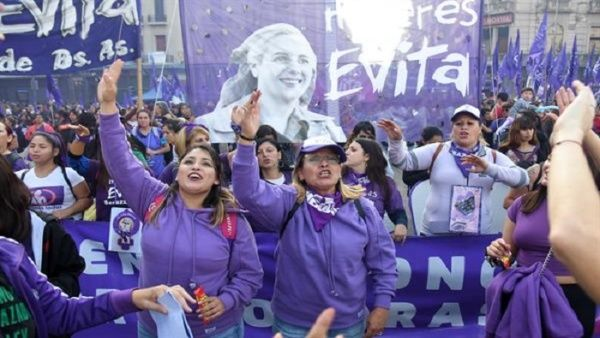
The Argentinean government has been the first country in the world to implement a new law to combat gender-based violence and femicides in Argentina. | Photo: EFE
Buenos Aires, June 4 (RHC)-- Social organizations and women's rights advocates mobilized this Saturday from various points of the Argentinean capital, Buenos Aires, marching to the Congress in rejection of femicides and gender-based violence, as well as to commemorate the eighth anniversary of the "NiUnaMenos" movement.
Demonstrators demanded the implementation of public policies to put an end to male violence and reduce femicides. According to the Supreme Court, there were 252 fatal victims of such acts in 2022. The women marched under the slogan "We want to be alive, free and unindebted. With this judiciary, there are no more deaths."
They denounced the impact of the multi-million-dollar debt contracted by the Government of Mauricio Macri (2015-2019) before the International Monetary Fund (IMF) and recalled that it causes a profound impact on family economies.
The protesters also questioned the revictimization of the justice system in the face of complaints from women and diversities, as well as the economic violence exercised by men driven by a patriarchal culture, who do not contribute to the child support quota.
During the mobilization, demands were made for the release of the leader Milagro Sala and for the government of President Alberto Fernández to pardon her. The referent of the Milagro Sala Front, Silvia Lanchez, denounced that the leader is arbitrarily imprisoned due to the maneuvers of the governor of the province of Jujuy, Gerardo Morales, and the distortions of the Judiciary. Lanchez made it clear that the adjustment policies caused by the debt contracted by Macri before the IMF affect women the most, particularly the poorest ones.
Every June 3rd is commemorated the first march held under the slogan "NiUnaMenos" -- a call motivated by the femicide of Chiara Paez, a 14-year-old pregnant teenager who was murdered by her partner, in 2015. From then to date until today almost 2,300 femicides occurred in Argentina.
The collective Grupo Matanza PJ denounced that "in Argentina a woman is killed every 28 hours" and "more than 60 percent die at the hands of a partner or ex-partner".
Although the main mobilization this Saturday took place in Buenos Aires, there were marches in all Argentine provinces.

